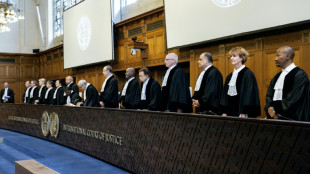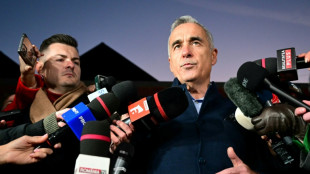
-
 Five things to know about NewJeans' shock split from agency
Five things to know about NewJeans' shock split from agency
-
Waste pickers battle for recognition at plastic treaty talks

-
 Ireland votes in closely fought general election
Ireland votes in closely fought general election
-
Top UN court to open unprecedented climate hearings

-
 European countries that allow assisted dying
European countries that allow assisted dying
-
British MPs to debate contentious assisted dying law

-
 Schmidt not expecting hero's welcome on Ireland return
Schmidt not expecting hero's welcome on Ireland return
-
PSG stuck between domestic dominance and Champions League woes

-
 'Hot fight' as unbeaten Bayern visit Dortmund fortress
'Hot fight' as unbeaten Bayern visit Dortmund fortress
-
Bordeaux-Begles' Samu 'not finished yet' with Wallabies

-
 Brook and Pope half-centuries haul England to 174-4 against NZ
Brook and Pope half-centuries haul England to 174-4 against NZ
-
Yen rallies on rate hike bets as equity markets swing

-
 Ukraine superstar Mahuchikh brings 'good vibes' to her war-torn country
Ukraine superstar Mahuchikh brings 'good vibes' to her war-torn country
-
PlayStation at 30: How Sony's grey box conquered gaming

-
 Saudi Arabia hosts UN talks on drought, desertification
Saudi Arabia hosts UN talks on drought, desertification
-
PlayStation: Fun facts to know as Sony's console turns 30

-
 Nepal's first transgender candidates run for local office
Nepal's first transgender candidates run for local office
-
Father of PlayStation says 'everyone told us we would fail'

-
 Ireland seek to overcome former coach Schmidt's Wallabies
Ireland seek to overcome former coach Schmidt's Wallabies
-
Detroit survive Bears comeback to make it 10 wins in a row

-
 Mexican actor Silvia Pinal dead at 93
Mexican actor Silvia Pinal dead at 93
-
'Black Friday' deals target inflation-weary US consumers

-
 Liverpool look to deepen Man City crisis, Amorim seeks first Premier League win
Liverpool look to deepen Man City crisis, Amorim seeks first Premier League win
-
Police fire rubber bullets, tear gas at Georgia protesters after PM delays EU bid

-
 England lose three quick wickets in reply to New Zealand's 348
England lose three quick wickets in reply to New Zealand's 348
-
Social media companies slam Australia's under-16 ban

-
 Police fire tear gas at Georgia protesters after PM delays EU bid
Police fire tear gas at Georgia protesters after PM delays EU bid
-
Canada watchdog sues Google over 'anti-competitive' ad tech

-
 Hojlund gives Amorim winning Old Trafford bow, Roma hold Spurs
Hojlund gives Amorim winning Old Trafford bow, Roma hold Spurs
-
Amorim wins first Man Utd home game after rollercoaster ride

-
 France arrests 26 as South Asian migrant trafficking ring smashed
France arrests 26 as South Asian migrant trafficking ring smashed
-
At least 15 dead, 113 missing, in Uganda landslides

-
 Netanyahu threatens 'intensive war' if Hezbollah breaches fragile truce
Netanyahu threatens 'intensive war' if Hezbollah breaches fragile truce
-
Bilbao join Lazio at Europa League summit, Chelsea cruise in Conference League

-
 In Lebanon's Tyre returning residents find no water, little power
In Lebanon's Tyre returning residents find no water, little power
-
Protests in Georgia after PM delays EU bid to 2028

-
 Biden slams Trump tariff threats as 'counterproductive'
Biden slams Trump tariff threats as 'counterproductive'
-
TikTok tactics shake up politics in Romania

-
 'He should do comedy' says Norris of Verstappen comments
'He should do comedy' says Norris of Verstappen comments
-
Americans celebrate Thanksgiving after bitter election

-
 Flood-hit Spain introduces 'climate leave' for workers
Flood-hit Spain introduces 'climate leave' for workers
-
UK's Starmer vows to slash net migration

-
 Recount order, TikTok claims throw Romania election into chaos
Recount order, TikTok claims throw Romania election into chaos
-
Jansen stars for South Africa as Sri Lanka crumble to 42 all out

-
 Bottas set for Mercedes return as Mick Schumacher quits reserve role
Bottas set for Mercedes return as Mick Schumacher quits reserve role
-
Putin threatens Kyiv with new hypersonic missile

-
 Georgia delays EU bid until 2028 amid post-election crisis
Georgia delays EU bid until 2028 amid post-election crisis
-
French PM announces concession in bid to end budget standoff

-
 Guardiola's ingenuity will solve Man City crisis, says Slot
Guardiola's ingenuity will solve Man City crisis, says Slot
-
South Africa in control after Sri Lanka crash to 42 all out


Fethullah Gulen: ex-Erdogan ally who became public enemy number one
A former ally of Recep Tayyip Erdogan, US-based Muslim cleric Fethullah Gulen spent years eluding the clutches of Turkey's president, who accused him of masterminding a failed 2016 coup.
After nearly 25 years living away from Turkey, Gulen died in hospital overnight, Turkish public television said, citing groups close to the 83-year-old preacher.
The head of the influential Hizmet group became the sworn enemy of the president.
Erdogan's government accused him of heading a "terrorist" organisation as well as organising the 2016 bid to overthrow the president.
But Gulen insisted Hizmet -- Turkish for "service" -- was simply a network of charitable organisations and businesses.
The pair were once allies.
Erdogan profited from Gulen's network to consolidate power after becoming prime minister in 2003 in the face of an entrenched secular establishment.
- From ally to nemesis -
But tensions began emerging in 2010 only to explode into full-on enmity three years later when a corruption scandal shattered Erdogan's inner circle.
Erdogan blamed Gulen for masterminding the graft probe through his network of supporters in the judiciary and the police, turning him into "public enemy number one".
Since then, Erdogan has since accused the influential cleric -- whose movement is present on every continent with its sprawling network of public schools -- of leading a parallel state designed to overthrow him.
The president's hatred intensified following the botched coup of July 2016, which he believes was engineered by his former ally.
In the immediate aftermath, the authorities began a crackdown on the preacher's supporters, or "Gulenists".
Nearly 700,000 people were prosecuted and some 3,000 were sentenced to life jail for playing a role in the coup, authorities say.
During the unprecedented purge, more than 125,000 public sector workers were sacked or suspended, including around 24,000 military personnel and thousands of judges.
The authorities shut down private schools, media outlets and publishing houses.
Turkish intelligence services also staged multiple overseas raids in countries across central Asia, Africa and the Balkans to round up Gulen's suspected supporters.
- From anonymity to spiritual leader -
Gulen was born in the eastern Turkish province of Erzurum. Public records say it was 1941 but Gulen said he was born in 1938.
Despite being "just another imam in the 1970s" Gulen quickly became "the spiritual leader of a vast community with millions of supporters", wrote researcher Bayram Balci.
Supporters were "present in all sectors of the economy, in education, in the media, and also in the administration", Balci, a researcher at the Paris Institute of Political Studies (Sciences-Po), said in a 2021 study.
"With a taste for secrecy and influence, and even manipulation and intimidation... Gulen's movement is very similar to various Catholic movements like the Jesuits, Opus Dei and others, from which it has clearly drawn inspiration," he said.
Turkish officials refer to Gulen's movement as the "FETO terrorist organisation".
It has sometimes been described as a "sect", with members known to help each other in business and expected to contribute their time or money, whether students, housewives or wealthy businessmen.
Gulen moved to the US state of Pennsylvania in 1999, ostensibly for health reasons.
Despite multiple attempts by Turkey to extradite him, Gulen led a reclusive life in exile on the edge of the Poconos, a scenic mountainous, wooded region of Pennsylvania.
burs-hmw/tw/gil
C.Meier--BTB
